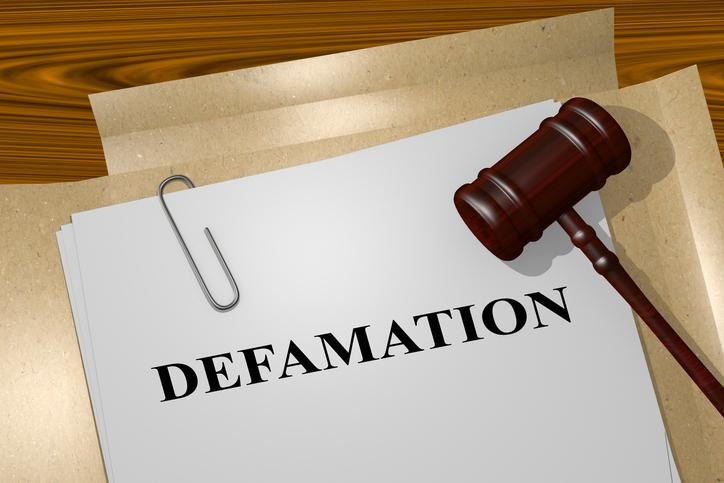
- posted: Jan. 30, 2024
- Defamation
Defamation is publishing a false statement that causes harm to another person’s or organization’s reputation. A defamation lawsuit can be brought only if the statement is an assertion of fact, not an opinion. Certainly, statements of opinion can tarnish reputations, but in the United States, opinions are protected by the constitutional right of free speech. However, sometimes a statement that purports to be an opinion is capable of being construed by an audience to have a factual basis. If so, and if the statement is false, it can amount to defamation.
One of the most problematic situations in defamation cases is when a statement mixes opinion and fact. A simple statement of opinion is based on underlying facts that have been established. But a mixed statement intertwines opinions with undisclosed or implied facts — or in recent parlance, “alternative facts.”
To resolve the fact/opinion dilemma, courts use a multi-factor test, analyzing the following:
- Precision of wording — Courts evaluate whether the language used implies an assertion of fact. If the language is loose, figurative or exaggerated, it may lean toward being an opinion. On the other hand, if the statement contains specific details, it might be treated as an assertion of fact.
- Verifiability — Factual statements are typically capable of being proven true or false through external sources. Opinions, by contrast, convey the speaker’s own sense of morality, propriety or other personal standards.
- General context — Courts consider how and where the statement was made, taking into account the medium and its audience. Statements made in an editorial, commentary or opinion piece may be more likely to be considered as expressions of opinion, while statements presented as news reports are typically treated as assertions of fact.
- Broader context — This level of analysis seeks to ascertain the credibility that might be accorded to the statement by any reasonable reader.
The fact/opinion analysis is especially difficult when it comes to statements made on the internet. Fact and opinion are routinely mixed in postings on social media platforms like Facebook, Twitter and Tik-Tok and discussion forums like Reddit, Quora and Digg. These online apps serve as news aggregators, and there is little or no effort by their hosts to control content. Posters often express opinions while linking to sources of uncertain veracity, thereby potentially spreading misinformation.
Despite the challenges posed in evaluating statements made on those new forms of media, the opinion defense is still a force to be reckoned with in defamation cases. Nevertheless, it is not bullet-proof. An experienced defamation attorney can demonstrate how statements alleged to be opinions might contain or imply untrue statements of fact for which you may be entitled to recover damages.
The attorneys at Hemmer Wessels McMurtry PLLC in Fort Mitchell help individual and business clients bring actions for defamation in West Virginia, Ohio, Kentucky and across the country. To schedule a consultation, call us at 859-344-1188 or contact us online.

- posted: Jan. 30, 2024
- Defamation
Defamation is publishing a false statement that causes harm to another person’s or organization’s reputation. A defamation lawsuit can be brought only if the statement is an assertion of fact, not an opinion. Certainly, statements of opinion can tarnish reputations, but in the United States, opinions are protected by the constitutional right of free speech. However, sometimes a statement that purports to be an opinion is capable of being construed by an audience to have a factual basis. If so, and if the statement is false, it can amount to defamation.
One of the most problematic situations in defamation cases is when a statement mixes opinion and fact. A simple statement of opinion is based on underlying facts that have been established. But a mixed statement intertwines opinions with undisclosed or implied facts — or in recent parlance, “alternative facts.”
To resolve the fact/opinion dilemma, courts use a multi-factor test, analyzing the following:
- Precision of wording — Courts evaluate whether the language used implies an assertion of fact. If the language is loose, figurative or exaggerated, it may lean toward being an opinion. On the other hand, if the statement contains specific details, it might be treated as an assertion of fact.
- Verifiability — Factual statements are typically capable of being proven true or false through external sources. Opinions, by contrast, convey the speaker’s own sense of morality, propriety or other personal standards.
- General context — Courts consider how and where the statement was made, taking into account the medium and its audience. Statements made in an editorial, commentary or opinion piece may be more likely to be considered as expressions of opinion, while statements presented as news reports are typically treated as assertions of fact.
- Broader context — This level of analysis seeks to ascertain the credibility that might be accorded to the statement by any reasonable reader.
The fact/opinion analysis is especially difficult when it comes to statements made on the internet. Fact and opinion are routinely mixed in postings on social media platforms like Facebook, Twitter and Tik-Tok and discussion forums like Reddit, Quora and Digg. These online apps serve as news aggregators, and there is little or no effort by their hosts to control content. Posters often express opinions while linking to sources of uncertain veracity, thereby potentially spreading misinformation.
Despite the challenges posed in evaluating statements made on those new forms of media, the opinion defense is still a force to be reckoned with in defamation cases. Nevertheless, it is not bullet-proof. An experienced defamation attorney can demonstrate how statements alleged to be opinions might contain or imply untrue statements of fact for which you may be entitled to recover damages.
The attorneys at Hemmer Wessels McMurtry PLLC in Fort Mitchell help individual and business clients bring actions for defamation in West Virginia, Ohio, Kentucky and across the country. To schedule a consultation, call us at 859-344-1188 or contact us online.








